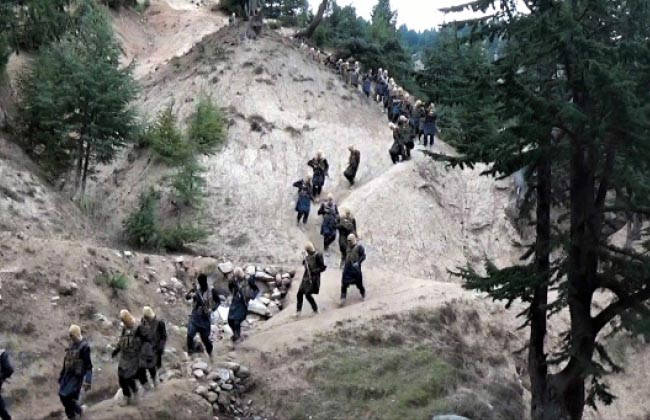Stoking sectarian violence in Afghanistan is the main reason behind the attacks carried out by die-hard loyalists to the Islamic State (IS) group which is operating under the black flag with radical ideology. Following the revelation of Mullah Omar’s death, the Taliban’s one-eyed leader, a number of the Taliban militants pledged allegiance to Abu Bakr al-Baghdadi to continue their insurgency more violently. Subsequently, people were left at the mercy of sectarian violence and killed on the grounds of their race, color and creed on a large scale.
The Taliban fighters, who changed their white flag into black one, seek to toe the line and exercise the ideological mindset of the IS militants which is more radical than that of the Taliban. A spate of terrorist attacks, mostly claimed by the IS group, looms large and inflicts heavy casualties upon Afghan soldiers and civilians.
Sectarian violence was practiced in Afghanistan during despotic regimes, especially the Taliban – who discriminated and killed people on the basis of their racial and religious backgrounds despite the fact that they claimed to implement the divine rule rather than acting ethnocentrically. Initially, the Taliban militants fulfilled their promises, but their attitudes were colored with ethnic tendency which would pave the way to gain the support of certain tribe in Afghanistan.
With the fall of the Taliban’s regime, there was zero tolerance towards sectarianism. In other words, people paid heavy sacrifices as result of sectarianism and racial superiority, fueled by the Taliban regime, and intended to stop this wound from bleeding through practicing the spirit of brotherhood. Furthermore, democratic discourse left no room for racial and religious superiority and all were equal in rights and dignity. That is to say, the constitution of Afghanistan, approved in 2004, denied discrimination based on racial, sexual or religious backgrounds and declared equal rights for all Afghans – who nurtured a gleam of hope for a bright future.
Nonetheless, sectarian violence was ushered in with the emergence of the IS insurgents in Afghanistan within the two past years. They make no bone about claiming responsibility for attacks on ethnic groups or religious and/or sacred sites. The IS and its loyalists carry out massive attacks on mosques, religious proceedings, funeral ceremonies, etc. to trigger sectarian sensitivity. In the past, they also resorted to abducting and slaughtering ethnic minorities, including women and children. Thanks to the nation’s insight about the sinister intention of the militants. Afghans went to the bottom of the issue and realized the ulterior motive for the attacks.
Virtually the IS group, which has lost its territory in Iraq and Syria, intends to sow the seed of sectarianism in Afghanistan so as to capitalize on this issue. The violent and sectarian practices of IS group will be condemned nationally and internationally, but it will not alleviate the challenges. Willy-nilly, this issue will pose more serious threat to the country in the process of time. In other words, it will not only lead to casualties but also fragment the spirit of brotherhood in the society if it is not curbed. To put it succinctly, officials will not have to downgrade the issue but keep a lid on it immediately. Otherwise, the current situation will go from bad to worse and Afghans will sustain heavier casualties.
It is believed that the mastermind behind sectarian attacks feeds the militants both ideologically and economically (there are ideologue and mercenary fighters) to continue war and violence in order to achieve their sinister objectives. Hence, targeting ethnic and religious groups will continue unabated which will keep the cycle of civilian fatalities running.
On the other hand, radical militants, including IS and the Taliban, are most likely to encounter lack of forces and seek to recruit soldiers through spreading their ideology and preaching via media outlet. Waging itself in the furrow of Sunnis and Shiites and excommunicating a group will make their goal more achievable.
Last but not least, the series of attacks will create a cleavage between state and nation. People’s rights and liberties are violated to a great extent. There is a strong sense of fear across the country. That is to say, targeting civilians is the main reason behind causing mistrust between people and government.
To sum up, with the increase of IS militants, sectarianism will change into a highly serious threat to the country. It is a big tragedy for the nation to count the growing fatalities each and every day. So, the government has to adopt an effective strategy to mitigate sectarian violence and put an end to civilian casualties. Calling terrorist acts against humanity and condemning it in the strongest possible term will neither heal the wound of victims’ families nor alleviate the issue.
Home » Opinion » IS Stokes Sectarian Violence
IS Stokes Sectarian Violence
| Hujjatullah Zia

